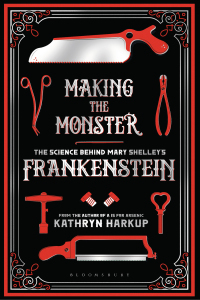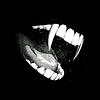Take a photo of a barcode or cover
informative
medium-paced
challenging
dark
informative
dark
informative
medium-paced
"Making the Monster" is a fascinating and educational read. It spends a lot of time discussing the context in which "Frankenstein" was written, speculating over how Victor might have made his creature by discussing the scientific beliefs of the 1700s and the state of human understanding and experimentation. Kathryn Harkup talks about: Volta and Galvani's experiments involving electricity; fears involving dissection and graverobbing (specifically in England, where available cadavers were in short supply); Percy Shelley's fascination with the sciences as a young boy; and the various scientists Mary Shelley could have known personally or otherwise learned about through her father and other acquaintances.
My favorite section from this book addresses how death was measured before brain waves could be scanned. Typically, death was defined by the cessation of the heart, even though stethoscopes had yet to be invented, and faint heartbeats could persist unbeknownst to those listening in. It's neat to think about the importance placed on organs such as the heart in this era, while the significance of the brain was not fully acknowledged. It's also fascinating (albeit disturbing) to think about the contemporary horrors that "Frankenstein" evoked when it was first published, from criminals whose bodies were donated to the sciences as a final punishment for their crimes to disturbing experiments with corpses and electric shocks. I can see why the popular image of "Frankenstein" involves lightning storms and galvanism!
My only complaint about this book is that I caught a few typos, although they were relatively minor and did not impede my understanding of the text. "Rees's" was misspelled as "Ree's" near the end, and certain Italian names were inconsistently spelled: Diodati became Diadati once, and Cavallo become Cavello. I noticed these rather easily, because not only do I have an eye for typos, but I also know Italian. I saw Cavallo turn into Cavello and thought to myself, "Wait, where did the horse go?"
Regardless, this book is a great read, and I would recommend it to any fans of "Frankenstein" who have the stomach for a little bit of medical gore and malpractice. I learned a lot about the eighteenth century, which horrifies and intrigues me in equal measure. The places I go to learn more about "Frankenstein"...
My favorite section from this book addresses how death was measured before brain waves could be scanned. Typically, death was defined by the cessation of the heart, even though stethoscopes had yet to be invented, and faint heartbeats could persist unbeknownst to those listening in. It's neat to think about the importance placed on organs such as the heart in this era, while the significance of the brain was not fully acknowledged. It's also fascinating (albeit disturbing) to think about the contemporary horrors that "Frankenstein" evoked when it was first published, from criminals whose bodies were donated to the sciences as a final punishment for their crimes to disturbing experiments with corpses and electric shocks. I can see why the popular image of "Frankenstein" involves lightning storms and galvanism!
My only complaint about this book is that I caught a few typos, although they were relatively minor and did not impede my understanding of the text. "Rees's" was misspelled as "Ree's" near the end, and certain Italian names were inconsistently spelled: Diodati became Diadati once, and Cavallo become Cavello. I noticed these rather easily, because not only do I have an eye for typos, but I also know Italian. I saw Cavallo turn into Cavello and thought to myself, "Wait, where did the horse go?"
Regardless, this book is a great read, and I would recommend it to any fans of "Frankenstein" who have the stomach for a little bit of medical gore and malpractice. I learned a lot about the eighteenth century, which horrifies and intrigues me in equal measure. The places I go to learn more about "Frankenstein"...
Graphic: Medical content, Medical trauma
Received via Netgalley in exchange for a fair and unbiased review.
I want you to imagine yourself in the middle of a drought-devastated landscape. The ground is cracked and bone dry, with little to no water in sight. In that ground is buried treasures. Not one big chest of treasure, but lots of little pieces, some bigger than others. And you need to dig in with your fingers to find it all.
Now, about this book.
Mary Shelley is so damn cool, y'all. If you get the chance, you should definitely read a well written biography on her. Her parents were progressive as hell, she and her husband were such radical thinkers, and they were friends with some of the coolest people of the 19th century.
She deserves better than this. There are so many tasty tidbits sprinkled throughout this book. You just have to dig through all of the science. So much dry, dry, dry science. This book is screaming.

Mary Shelley deserves better.
My recommendation: Read a Shelley biography, then go pick up [b: Stiff|32145|Stiff The Curious Lives of Human Cadavers|Mary Roach|https://images.gr-assets.com/books/1347656489s/32145.jpg|1188203] by Mary Roach. She does this topic in an intensely interesting way.
What a damn shame.
I want you to imagine yourself in the middle of a drought-devastated landscape. The ground is cracked and bone dry, with little to no water in sight. In that ground is buried treasures. Not one big chest of treasure, but lots of little pieces, some bigger than others. And you need to dig in with your fingers to find it all.
Now, about this book.
Mary Shelley is so damn cool, y'all. If you get the chance, you should definitely read a well written biography on her. Her parents were progressive as hell, she and her husband were such radical thinkers, and they were friends with some of the coolest people of the 19th century.
She deserves better than this. There are so many tasty tidbits sprinkled throughout this book. You just have to dig through all of the science. So much dry, dry, dry science. This book is screaming.

Mary Shelley deserves better.
My recommendation: Read a Shelley biography, then go pick up [b: Stiff|32145|Stiff The Curious Lives of Human Cadavers|Mary Roach|https://images.gr-assets.com/books/1347656489s/32145.jpg|1188203] by Mary Roach. She does this topic in an intensely interesting way.
What a damn shame.
5/5 ☆
"We find ourselves sympathizing with the brutal, ugly, violent monster." (P. 247)
Hace mucho tiempo que deseaba leer este libro y una querida amiga me lo envió con mucho amor de su parte; básicamente, empezamos más que bien con este libro.
Luego de meses de tener un reading block, sumado a lo que mencione anteriormente de este regalo y la hermosa dedicatoria que enviaron con él, logré salir de a poco de este reading slump, logrando exitosamente que este escribiendo esta reseña a las 2:43 a.m. porque recién acabo de terminar el libro y necesito escribir mi opinión antes de perder las ideas frescas en mi cabeza.
No sabría cómo definir este libro sin que se mal entienda. Empecemos por lo obvio: lo amé. Una vez más descubro que amo la no ficción, sobre todo si tiene alto contenido histórico; también me inspiró mucho durante toda la lectura a volver a leer Frankenstein con esta nueva perspectiva en mente, sabiendo lo que sé ahora respecto a los avances (y falta de) científicos en los que se contextualiza la novela de Mary Shelley.
Dicho esto, es uno de los libros más terroríficos y asquerosos que he leído: la descripción detallada y la brutalidad de los experimentos científicos sobrepasan la ficción, y por momentos sentí genuino asco mientras leía. Todo esto tuvo como resultado el avance tecnológico, sobre todo en el área de la medicina, que tenemos hoy en día. No es agradable leerlo eso sí. Fue una lectura muy interesante, desagradable, pero realmente cautivadora; además me gustó mucho la forma de escribir de la autora, quien hila muy bien el relato, tiene una prosa simple pero que te engancha, y explica de manera clara y directa datos científicos que la gente ignorante como yo puede llegar a entender por la manera en que Harkup lo plantea.
Sí hubo un punto, relacionado a vacíos en información o datos, que iba a criticarle a la autora, pero ella misma plantea en sus agradecimientos que tuvo que dejar muchas cosas afuera, así que se lo perdono. Creo que lo que más me faltó de este proceso es el paralelismo entre la muerte de la madre de Victor con el trauma que significó para Mary vivir con el fantasma de su propia madre. Eso, y la discusión psicológica y social que quedó completamente afuera, pero también se puede entender porque no eran temas tan relacionados al tópico central de este libro, aunque sigo pensando que dejarlos afuera elimina un rasgo fundamental que permite a la autora a argumentar fácilmente desde la ciencia, pero que complejizaría más la discusión si se agregaran estos aspectos al libro.
Otra cosa que me gustaría mencionar antes de entregar mi conclusión, es que me sorprendió profundamente que en la bibliografía no estuviera el libro escrito por Charlotte Gordon, "Romantic Outlaws"(https://www.goodreads.com/book/show/22294061-romantic-outlaws), pero esto mismo produjo que me entusiasmara por leer las piezas biográficas en las que sí se basó Kathryn Harkup para escribir este libro.
Ahora sí, en resumen, me encantó el libro, lo encontré super interesante, se basa netamente en datos históricos mezclados con la biografía de la autora y los contextos sociopolíticos, éticos, morales y científicos que moldean Frankenstein, volviéndolo una lectura casi necesaria para entender en profundidad la novela (y el terror que causó en su momento). Si bien podría ser un libro incluso más extenso de lo que es, creo que la autora hizo bien en centrarse en solo un tópico específico y plantearlo de manera delimitada en el libro para no sobrecargar al lector de información, porque aún así el libro está cargado de puros datos de distinto tipo, pero relatado de manera clara, directa e interesante, por lo que quieres seguir leyendo a pesar del asco, horror y densidad de información que te está presentando la autora. Creo que es una lectura necesaria para entender Frankenstein de Mary Shelley, y que sería una buena adición a las librerías si este fuera traducido alguna vez al español; además, resulta una pieza interesante de plantear en contextos pedagógicos/escolares para realizar discusiones, junto con análisis históricos y científicos, del primer libro de ciencia ficción moderna.
"We find ourselves sympathizing with the brutal, ugly, violent monster." (P. 247)
Hace mucho tiempo que deseaba leer este libro y una querida amiga me lo envió con mucho amor de su parte; básicamente, empezamos más que bien con este libro.
Luego de meses de tener un reading block, sumado a lo que mencione anteriormente de este regalo y la hermosa dedicatoria que enviaron con él, logré salir de a poco de este reading slump, logrando exitosamente que este escribiendo esta reseña a las 2:43 a.m. porque recién acabo de terminar el libro y necesito escribir mi opinión antes de perder las ideas frescas en mi cabeza.
No sabría cómo definir este libro sin que se mal entienda. Empecemos por lo obvio: lo amé. Una vez más descubro que amo la no ficción, sobre todo si tiene alto contenido histórico; también me inspiró mucho durante toda la lectura a volver a leer Frankenstein con esta nueva perspectiva en mente, sabiendo lo que sé ahora respecto a los avances (y falta de) científicos en los que se contextualiza la novela de Mary Shelley.
Dicho esto, es uno de los libros más terroríficos y asquerosos que he leído: la descripción detallada y la brutalidad de los experimentos científicos sobrepasan la ficción, y por momentos sentí genuino asco mientras leía. Todo esto tuvo como resultado el avance tecnológico, sobre todo en el área de la medicina, que tenemos hoy en día. No es agradable leerlo eso sí. Fue una lectura muy interesante, desagradable, pero realmente cautivadora; además me gustó mucho la forma de escribir de la autora, quien hila muy bien el relato, tiene una prosa simple pero que te engancha, y explica de manera clara y directa datos científicos que la gente ignorante como yo puede llegar a entender por la manera en que Harkup lo plantea.
Sí hubo un punto, relacionado a vacíos en información o datos, que iba a criticarle a la autora, pero ella misma plantea en sus agradecimientos que tuvo que dejar muchas cosas afuera, así que se lo perdono. Creo que lo que más me faltó de este proceso es el paralelismo entre la muerte de la madre de Victor con el trauma que significó para Mary vivir con el fantasma de su propia madre. Eso, y la discusión psicológica y social que quedó completamente afuera, pero también se puede entender porque no eran temas tan relacionados al tópico central de este libro, aunque sigo pensando que dejarlos afuera elimina un rasgo fundamental que permite a la autora a argumentar fácilmente desde la ciencia, pero que complejizaría más la discusión si se agregaran estos aspectos al libro.
Otra cosa que me gustaría mencionar antes de entregar mi conclusión, es que me sorprendió profundamente que en la bibliografía no estuviera el libro escrito por Charlotte Gordon, "Romantic Outlaws"(https://www.goodreads.com/book/show/22294061-romantic-outlaws), pero esto mismo produjo que me entusiasmara por leer las piezas biográficas en las que sí se basó Kathryn Harkup para escribir este libro.
Ahora sí, en resumen, me encantó el libro, lo encontré super interesante, se basa netamente en datos históricos mezclados con la biografía de la autora y los contextos sociopolíticos, éticos, morales y científicos que moldean Frankenstein, volviéndolo una lectura casi necesaria para entender en profundidad la novela (y el terror que causó en su momento). Si bien podría ser un libro incluso más extenso de lo que es, creo que la autora hizo bien en centrarse en solo un tópico específico y plantearlo de manera delimitada en el libro para no sobrecargar al lector de información, porque aún así el libro está cargado de puros datos de distinto tipo, pero relatado de manera clara, directa e interesante, por lo que quieres seguir leyendo a pesar del asco, horror y densidad de información que te está presentando la autora. Creo que es una lectura necesaria para entender Frankenstein de Mary Shelley, y que sería una buena adición a las librerías si este fuera traducido alguna vez al español; además, resulta una pieza interesante de plantear en contextos pedagógicos/escolares para realizar discusiones, junto con análisis históricos y científicos, del primer libro de ciencia ficción moderna.
dark
informative
slow-paced
informative
reflective
slow-paced
dark
informative
mysterious
medium-paced
Writing my first ever review, because this book compelled me to. In short: stunning, amazing, brilliant, impeccable. If you like Frankenstein and you have any kind of interest in science whatsoever, this book is the perfect balance between scientific and historical detail, while having a storytelling-esque structure. By taking you through what scientists had discovered and were still discovering during Mary Shelley's lifetime, it shows you that actually, Victor's plan wasn't that crazy or unrealistic. He was just one of the many enthusiasts in the 18th and 19th centuries searching for "the spark of life", and some scientists appeared to get excitingly close. This book inadvertently makes you believe that what Victor did could even be slightly possible by providing real explanations and possibilities for the vague implications his narrative provides us with. Several times my belief was so suspended that at the end of a chapter I'd get mad when they hadn't actually managed to resurrect the freshly-hanged criminal. Anyway, read this book!!!!
I recently reread Frankenstein and I really enjoyed this adding historical context to why Frankenstein became a classic and how the science of the time were perfect for creating the science fiction genre. Most of the time when reading classics I feel like we assume a lot about how people must’ve felt based on like stereotypes of the time so it’s interesting actually KNOWING what the mentality of the time was. Obviously I knew Mary wrote Frankenstein during a getaway with her husband and Lord Byron but I didn’t know he was the one who offered her Percy’s heart after his death which she famously kept until her death. I didn’t know she essentially died in debt and was never fully able to gain financial success from her book despite its popularity. I didn’t know that when she was my age she had not only written Frankenstein but had already had and lost 4 children. I knew her mother was an early feminist but not her fathers MANY connections to popular scientist of the time which definitely influenced the science Victor Frankenstein was up to in the novel. I didn’t know most modern day depictions of Frankenstein can trace their imagery back to a musical.
Mary Shelley you will always be famous
Mary Shelley you will always be famous








